Mindfulness—one of the latest company program buzzwords. You’ve likely seen an article in your organization’s newsletter, a daily tip encouraging a mindful moment, maybe an in-office meditation program, or a free Calm subscription. Mindfulness is related to the quality of your awareness of the present moment.
Mindful self-awareness and my personal and professional life
I’m a corporate alum, 500hr Registered Yoga Teacher, Certified Life Coach and Health & Wellness Coach, and a long-time researcher of eastern philosophies. I taught Yoga at the ExxonMobil HQ on the side and worked in the corporate office full time in sales and business development. I’d listen as my students/coworkers would carry on about the stress. I would sympathize with them in a way that only someone who worked there would understand. Then I’d get the look. “WAIT… You work here? How do you show up here all zen?!”
It’s not about leaving it behind; it’s completely changing your relationship with stress, worry, and other states of mind that do not serve you. First, you have to develop an awareness of your changing states of mind—self-awareness. Without awareness, ingrained behavior will ALWAYS win in the moment. The cycle will continue until you acknowledge that there’s a better way. If you’re here, you know something needs to change.
Also, don’t beat yourself up.
Our brains are wired like this after tens of thousands of years. We’re master pattern recognizers and tribesmen. We have this faculty to thank for our survival. However, during a performance review, the same reaction that saved you from predators doesn’t quite serve you anymore. The brain, specifically your amygdala, knows no difference.
The time course of emotional responding is a critical attribute in an individual’s propensity for anxiety.
Fortunately, we’ve also developed the crucial differentiator between modern and primitive man, the Prefrontal Cortex (PFC). I like to call this “the executive brain,” an emotional regulator. The PFC is the part that’s hard at work, burning more calories and dilating your pupils when you’re weighing decisions, solving complex problems, or overcoming unconscious bias. Your amygdala is the horse, and your PFC is the reins.
Mindfulness Meditation—the practice of observing the changing states of mind without judgment.
Mindfulness Meditation is the best method to develop your awareness. You’ll learn to disassociate your Self from your thoughts and notice sensations and emotions caused by these thoughts. Here, you find the root of old behaviors that lead to stress, anxiety, shame, guilt, fear, and more. Many other practices help you be present, such as the Emotional Freedom Technique (EFT) or tapping, a moving meditation, or journaling. You can also add simple question reminders throughout your day that prompt you, “What is happening right now, inside and out?” Check THIS out to learn more about meditation’s influence on the PFC.
This is the moment you’re able to change your life.
When a person or circumstance pushes you towards your edge, peering over the cliff at stress, anger, doubt, or fear. Then… The pause. A moment when the distance between the situation and your old automatic reaction becomes large enough for you to notice what is happening and make a CHOICE of how you want to respond. This is awareness.
Now, you are in the diver’s seat—the ability to shift mindfully in the moment. Choose trust, faith, gratitude, compassion, connection, or any other response that creates more peace in your life. Now everything in your life is happening FOR you, not TO you—taking purposeful action now that you notice. So you have to choose from moment to moment. It’s a lifelong practice, and there’s no winning at this game.
This is why mindfulness is the foundation of all we do at Humessence. The only way to make purposeful changes in line with your values is to have a firm understanding of where you are and what is happening in the present moment. You can take courses or read all of the literature out there, and if you haven’t practiced understanding your mind, forget it.
Our external lives reflect our internal state of being.
The dynamic of our teams, our culture, and ultimately our society are all reflections of our inner world. Let us help you change yours.

